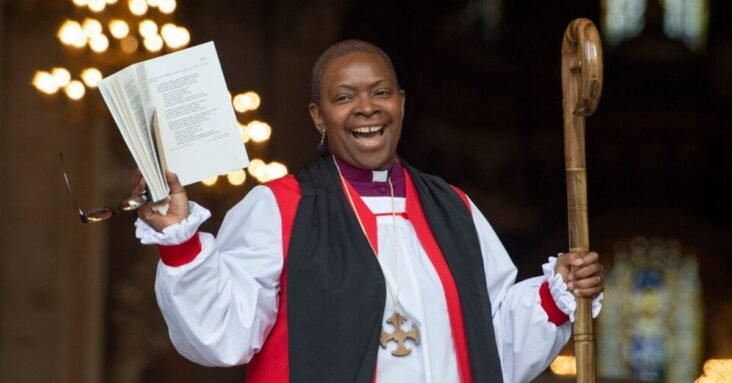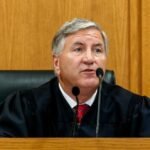
Rt Rev Rose Hudson-Wilkin says the Church needs to ‘further embed racial justice’ and should not be afraid of being called ‘woke’
The Church of England has told all of its parishes to draw up “race action plans” after a pro-Black Lives Matter (BLM) bishop urged it to embrace being “woke”.
The General Synod, the Church’s legislative body, passed a motion on Sunday which said it should “encourage parishes and deaneries to develop local action plans to address issues of racial injustice”.
The Rt Rev Rose Hudson-Wilkin, the Bishop of Dover, said the Church needed to “further embed racial justice” and should not be afraid of being called “woke”.
“Those who are frightened by the authenticity of this movement want to scare us into thinking that being woke is a sin created by people on the Left,” she said.
Bishop Hudson-Wilkin led prayers at the wedding of Prince Harry and Meghan Markle in May 2018 and has been an outspoken supporter of BLM.
She called on the Church to expand the number of bishops, cathedral deans and other senior churchmen who are from ethnic minorities.
‘Pernicious sin’
The Very Rev Rogers Govender MBE, the Dean of Manchester, told Synod that the Church’s failure to do so before now was a “pernicious sin”.
No members stood up to make speeches opposing the motion as it passed by 364 votes in favour to zero against, with two abstentions.
The Archbishop of York, the Most Rev Stephen Cottrell, spoke animatedly as he said the Church “has not been good enough” on diversity and inclusion, that “racism and discrimination rupture our body” and asked, “May the Lord have mercy upon us”.
The Rt Rev Martin Gorick, the Bishop of Dudley, said every Anglican who becomes a parish representative in his Diocese of Worcester now has to undertake compulsory unconscious bias training.
Bishop Hudson-Wilkin said in response that every other diocese should follow suit.
The training was axed across government and the civil service in December 2020 because there was “no evidence” that it improved equality.
The Rev Rachel Webbley, team rector in Whitstable, Kent, told Synod she was a “recovering racist” and said she was shocked by “just how much white resistance there is to feeling discomfort about racial injustice”.
Daniel Matovu, a lay member of Synod, added that he had been forced to bear a cross throughout his life “because of the colour of my skin”.
“You white folks have no idea, particularly those of you who are white male, heterosexual and not disabled,” he said. “You’ve only been given small sticks to carry, with which to beat the rest of us.”
David Hermitt, another lay member, said the Church needed to become more anti-racist to reverse its falling membership figures because “young people” are “more radical than we are”.
‘Politics of grievance’
However Dr Rakib Ehsan, the author of Beyond Grievance: What the Left Gets Wrong About Ethnic Minorities, told The Telegraph: “It appears that no sphere of British life is free of divisive identitarian thinking – including the Church of England.
“Abandoning traditional Christian values in favour of the unholy trinity of diversity, equity, and inclusion, the established Church of the land risks alienating conservative ethnic minorities who have little time for the politics of grievance and victimhood.”
The Church’s most recent data shows 4.1 per cent of clergy are from an ethnic minority background, compared to the 18.3 per cent that make up the total population in England and Wales.
The Church does not regularly collect data on the diversity of congregations but in 2014, when the most recent audit was conducted, seven per cent of churchgoers were found to come from ethnic minorities.
Bishop Hudson-Wilkin’s motion also called on dioceses to prioritise the “collection, monitoring and measuring of relevant data” and asked for a “review and strengthening of the role of the Committee for Minority Ethnic Anglican Concerns” to be considered.
The committee advises the Archbishops of Canterbury and York on race and advocates for “positive action to increase the inclusion and representation of BAME people across the Church”.
‘Structural change’
The bishop was born in Jamaica and became the first black female Church of England bishop when she was appointed to the see of Dover in 2019.
In June 2020, she addressed BLM protestors outside Canterbury Cathedral and called for “structural change in all walks of life” in response to the death of George Floyd.
She also said that month that the Church discriminated against black clergy and was “still stuck” in a mindset that “black people couldn’t possibly lead, or can only minister to black people”.
In April 2021, she condemned as “deeply disturbing” a Government-backed review of race in Britain that found this country “should be regarded as a model for other white-majority countries” on race relations.
In February 2020, the Church issued an apology for racism as the Archbishop of Canterbury said there was “no doubt” that it was “deeply institutionally racist”.
Dr Alka Sehgal Cuthbert, the director of Don’t Divide Us, said: “Black people, like anyone else, need the same justice as their fellow citizens, not a special ‘racial’ kind – you’d think a religion that preaches we’re all equal in God’s eyes would get this.”



